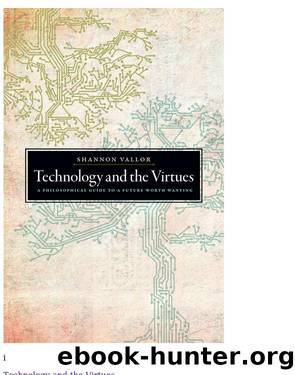Technology and the Virtues by Shannon Vallor

Author:Shannon Vallor
Language: eng
Format: epub
Published: 2017-02-05T09:00:28+00:00
6.12 Magnanimity: Moral Leadership
and Nobility of Spirit
[Related Virtues: Equanimity, Courage, Ambition]
The Aristotelian virtue of magnanimity, or megalopsuchia (greatness of soul or spirit), has been the object of much modern critical scorn. It is often associated with an entitled sense of political and personal superiority, and the idea that a
152
15 2
t e c h n o l o g y a n d t h e v i r t u e s
virtuous person ought to believe and feel himself ‘above’ the troubles and concerns of others. Understood in this sense, we might see magnanimity as inimical to the technomoral virtues of justice, empathy, care, civility, and perspective we highlighted above, and thus a better candidate for a technomoral vice. So what should the reader make of its presence here?
First, we should note that while the characterization given above might well have described some members of the Athenian polis that Aristotle greatly admired, this would be the result of a failure by Aristotle to correctly apply his own concept. First, his concept of magnanimity or ‘greatness’ is an explicitly moral one, thus excluding political and economic status as conditions of its satisfaction, except insofar as in a particular society these happen to be contingent prerequisites for one’s moral development (as Aristotle thought some degree of material and political fortune were). The point here is that an inflated sense of superiority, or one that is based on one’s political or economic status rather than one’s character, is by definition contrary to the virtue of magnanimity. Only a morally excellent person who has cultivated virtue to an exceptional degree (is unusually just, honest, wise, etc.) can be a megalopsuchos (‘great- souled man’).
Furthermore, the sense in which the ‘great- souled’ or magnanimous person is ‘above’ the common person is chiefly concerned with their lack of pettiness— their unwillingness to defile their virtue by scrabbling in the dirt over trivial advantages, honors, titles, prizes, or other ego- boosting trifles. The great- souled person does not ignore these things because he wishes to be above others, rather he is above others just because he tends to ignore these things. The things the great- souled person values are more valuable. The magnanimous person is the one who has a sense of nobility and self- worth founded in a lifetime of moral and social efforts rather than relatively meaningless zero- sum contests of ego. The magnanimous person can afford to be generous in spirit where others are not. He can absorb a petty insult without having to repay it.
He can warmly greet the person who has pretended not to notice his arrival.
He can let the other car swoop into ‘his’ parking space at the mall without responding like a rabid dog.
Of course there is no doubt that Aristotle’s conception of magnanimity is rid-dled with indefensible gender, ethnic, and class bias. Property- owning Greek men could be great- souled. Women, Persians, and slaves could not. It is also true that ancient Greek culture would have fostered specific acts of
Download
This site does not store any files on its server. We only index and link to content provided by other sites. Please contact the content providers to delete copyright contents if any and email us, we'll remove relevant links or contents immediately.
Enlightenment Now: The Case for Reason, Science, Humanism, and Progress by Steven Pinker(6849)
A Journey Through Charms and Defence Against the Dark Arts (Harry Potter: A Journey Through…) by Pottermore Publishing(4710)
A Journey Through Divination and Astronomy by Publishing Pottermore(4235)
The Immortal Life of Henrietta Lacks by Rebecca Skloot(4226)
Elon Musk by Ashlee Vance(3827)
Origin Story: A Big History of Everything by David Christian(3451)
COSMOS by Carl Sagan(3317)
Alchemy and Alchemists by C. J. S. Thompson(3270)
Enlightenment Now by Steven Pinker(3254)
Shadow of Night by Deborah Harkness(3156)
Inferior by Angela Saini(3131)
A Mind For Numbers: How to Excel at Math and Science (Even If You Flunked Algebra) by Barbara Oakley(3083)
Bad Pharma by Ben Goldacre(3068)
Origin Story by David Christian(2966)
Signature in the Cell: DNA and the Evidence for Intelligent Design by Stephen C. Meyer(2855)
The Code Book by Simon Singh(2827)
The Elements by Theodore Gray(2818)
A Brief History of Time by Stephen Hawking(2800)
A Journey Through Potions and Herbology (A Journey Through…) by Pottermore Publishing(2759)
